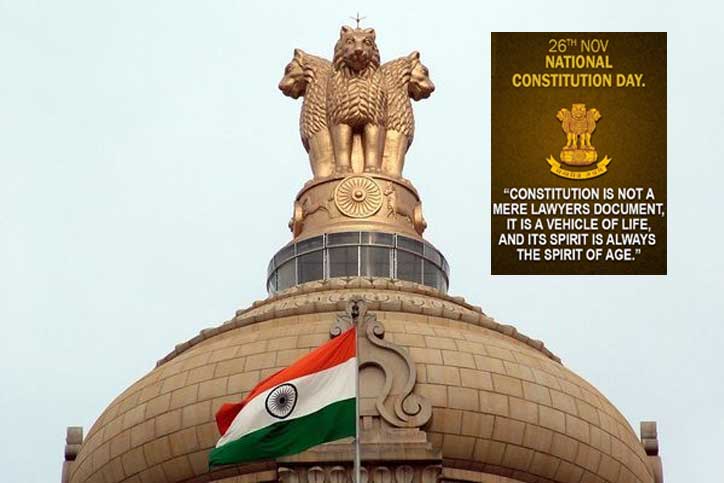 From
From last year onwards 26th November is being observed as the Constitution Day. It was on 26th November 1949 the Constituent Assembly adopted, enacted and gave to the people of India the Constitution. It is a historic day.
Our Constitution not only provided us a legal framework and fundamental law for governance but also a blue print for social and economic development of our nation which suffered exploitation and underdevelopment because of centuries of colonial rule and indigenous inequities such as caste system and deprivation and exclusion suffered by women and weaker sections of society.
While most of the countries in Asia and Africa could not sustain their constitutions, India remained an exception and till today our polity and society to a great extent stand distinguished in the whole world for upholding the Constitution. Our unity and integrity has been sustained and nourished because of the Constitution.
The fact that every MLA and MP swears by the Constitution at the time of taking oath speaks volumes for its relevance as the binding glue for our nation. We have cohered together as a nation because of the Constitution and parliamentary democracy and now rest of the world marvels at our Constitution as a legal framework which affirms equality for all irrespective of faith pursued and language spoken by individual citizens.
It captures in its scope our complex but delightful diversities and provides us the secular framework for governing the country. It celebrates as much the law and jurisprudence as the values of our ancient civilisation. No wonder that that an American expert on Indian Constitution Professor Graneville Austin described our Constitution as the corner stone of our nation.
Prime Minister Modi after winning the May 2014 general elections hailed our Constitution and owed his success to the constitutional process of our country. When Gorbachev, during his meeting with Margaret Thatcher in late 1980s, expressed his apprehensions that his country, the Soviet Union, would get disintegrated, he was advised by Magi Thatcher to look at India which through its Constitution could forge unity and solidarity among diverse ethnic identities and sustain its unity and integrity.
That is why Dr. B.R.Ambedkar stressed on cultivation of constitutional morality for safeguarding the unity of our country and ensuring liberty, equality and fraternity to our citizens.
He also stressed on employment of constitutional method to redress grievances of people and cautioned that any other method contrary to the Constitution would spell grammar of anarchy. In fact he famously stated that India needed a religion based not on scriptures but on liberty, equality and fraternity. And these ideals have been invoked in the preamble to our Constitution.
In other words we need a religion affirming compatibility with our Constitution which is a fine example of law, jurisprudence and our civilisational values. Celebrated jurist Justice Krishna Iyer saw within the scope of our Constitution the eternal principles of Patanjali's yogic principles even as he saw in it the progressive principles of law and jurisprudence.
# Mr Satya Narayan Sahu was OSD and Press Secretary to the late President of India Shri K.R. Narayanan and served as Director in the Prime Minister's Office. He is currently Joint Secretary in the Rajya Sabha Secretariat. The views expressed by him are personal and not that of Rajya Sabha Secretariat.
 From last year onwards 26th November is being observed as the Constitution Day. It was on 26th November 1949 the Constituent Assembly adopted, enacted and gave to the people of India the Constitution. It is a historic day.
From last year onwards 26th November is being observed as the Constitution Day. It was on 26th November 1949 the Constituent Assembly adopted, enacted and gave to the people of India the Constitution. It is a historic day. 